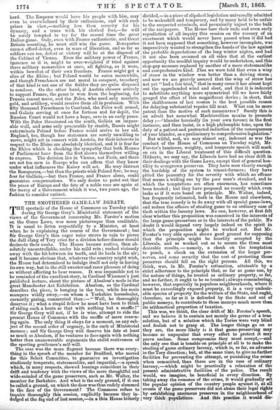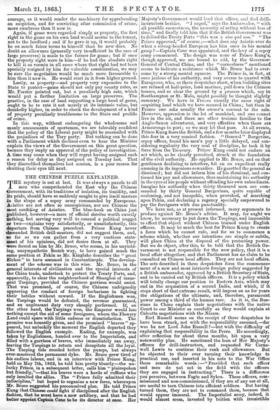THE SMOTHERED GAME-LAW DEBATE. T HE spectacle of the House of
Commons on Tuesday night during Sir George Grey's Ministerial statement of the views of the Government concerning Mr. Forster's motion on the Game Laws, was more picturesque than creditable. It is usual to listen respectfully to a Minister, at least when he is explaining the course of the Government ; but Sir George Grey's thin eager voice strove in vain to pierce the dull clang of Tory cries for a division before dinner should decimate their ranks. The House became restive, then ab- solutely uncontrollable, under his mild rein ; rushed viciously away with the bit between its teeth, and its heels in the air; and it became obvious that, whatever the country might wish, the House had determined to indulge itself not only in having its own way, but in the still sweeter and rarer pleasure of doing so without affecting to hear reason. It was impossible not to be reminded of the excellent story, in Cardinal Wiseman's just published lecture, about the picture of Absalom's mule in the great Manchester Art Exhibition. Absalom, as the Cardinal describes the piece, is hanging in the tree, while his mule scampers wildly away,—on whom a Yorkshire horsedealer, earnestly gazing, commented thus :—" Well, he thoroughly deserves it ; what a stupid fellow he must have been to think of riding such a brute as that with nothing but a snaffle !" Sir George Grey will not, if he is wise, attempt to ride the present House of Commons with the snaffie of mere reason- ing again. The only thing it obeys for a moment, on any sub- ject of the second order of urgency, is the curb of Ministerial menace ; and Sir George Grey will deserve his fate at least as mach as Absalom, if he ventures to face again with nothing better than unanswerable arguments the stolid restiveness of the sporting gentlemen's self-will.
The case was the more flagrant because there was every- thing in the speech of the member for Bradford, who moved for this Select Committee, to guarantee an investigation studiously temperate, statesmanlike, and impartial,--a speech which, in many respects, showed leanings coincident in their drift and tendency with the views of the more thoughtful and wide-minded of the game preservers, such as Mr. Walter, the member for Berkshire. And what is the only ground, if it can be called a ground, on which the door was thus rudely slammed in the face of the Government? The Commons refuse to inquire thoroughly this session, explicitly because they in- dulged at the fag end of last session,—in a thin House bitterly divided,—in a piece of slipshod legislation universally admitted to be makeshift and temporary, and by many held to be unfair to the suspected criminals, and pecuniarily unjust to the bulk of the ratepayers. The House base their rude and even surly repudiation of all inquiry this session on the recency of an enactment which would never have passed when it did had it not been supposed that something, however incomplete, was imperatively wanted to strengthen the hands of the law against the probable depredations of the long winter nights, and had it not also been assumed on all sides that at the earliest opportunity the needful inquiry would be undertaken, and this stop-gap measure replaced by another of a more statesmanlike and comprehensive kind. Then we were told that even a wisp of straw in the window was better than a driving storm ; and now we are gravely assured that the wisp of straw has not yet "had a fair trial," that in many cases it has almost kept out the apprehended wind and sleet, and that it is indecent to substitute anything more symmetrical till we have fairly gauged the effect of this magnificent device ; in short, that the shiftlessness of last session is the best possible reason for delaying substantial repairs till next. What can be more patent than the motive of such xnanceuvres ? Surely this is an adroit but somewhat Machiavellian maxim to promote delay ;---' blunder hurriedly (in your own favour) in the first instance, and then insist, in a high philosophic tone, upon the duty of .a patient and protracted induction of the consequences of your blunder, as a preliminary to comprehensive legislation.'
But wilful, and, we may almost say, indecent as was the conduct of the House of Commons on Tuesday night, Mr. Forster's luminous, weighty, and temperate speech will mark an era in the Liberal treatment of this difficult question. Hitherto, we may say, the Liberals have had no clear drift in their dealings with the Game Laws, except that of general hos- tility to overgrown preserves. They have seen clearly enough the hardship of the system to tenant-farmers; they have pitied the peasantry for the severity with which an offence that seems a trifling one by the poor man's standard, and to which the temptations are often enormous, has sometimes been treated ; but they have proposed no remedy which even looks as if it were based on principle. Mr. Walter, indeed, has frequently intimated, both in the House and elsewhere, that the true remedy is to do away with all special game-laws, and reduce the offence of stealing game to an ordinary case of theft within the larceny laws. No one, however, at first felt clear whether this proposition was conceived in the interests of the large game-preservers or in the interests of the public. No doubt it would depend very largely indeed on the spirit in which the proposition might be worked out. But Mr. Forster's very able speech shows good ground for supposing that the principle might be heartily accepted by the Liberals, and so worked out as to secure the three most desirable results, —namely, a check on the temptation to poach, a check on the, extension of the Larger pre- serves, and some security that the cost of protecting those preserves should fall on the right persons. All this, we think, was, in Mr. Forster's estimation, attainable by a strict adherence to the principle that, so far as game can, by the nature of things, be treated as ordinary property, so far, and no farther, it ought to be so treated ; always remembering, however, that especially in populous neighbourhoods, where it must be exceedingly exposed property, it is a very undesir- able species of property for the welfare of the State, and ought, therefore, so far as it is defended by the State and out of public moneys, to contribute to those moneys much more than its arithmetical proportion of taxation.
This was, we think, the clear drift of Mr. Forster's speech, and we believe it to contain not merely the germs of a true solution, but of a solution which the Tories were very blind and foolish not to grasp at. The longer things go on as they are, the more likely is it that game-preserving may become so unpopular that every effort to protect it may prove useless. Some compromise they must accept, —and the only one that is tenable on principle at all is to make the stealing of game ordinary larceny, which is, so far, an advance in the Tory direction; but, at the same time, to give no further facilities for preventing the attempt, or punishing the crime when committed, than there are in the case of ordinary larceny,—which might be practically a relaxation of the present administrative facilities of the police. The result would, we imagine, be beneficial in every direction. By taking away the romance of the crime, it would gradually set the popular opinion of the country people azainst it, at all events if the game-preservers did not abuse their legal rights by establishing enormous preserves in the neighbourhood of very thick populations. And this practice it would die- courage, as it would render the machinery for apprehending on suspicion, and for convicting after commission of crime, more cumbrous than it now is.
Again, if game were regarded simply as property, the first right in the game on his own land would accrue to the tenant, not to the landlord ; and if he gave it up, it would probably be on much fairer terms to himself than he now does. No doubt an allowance (generally very insufficient in the case of large preserves) is made to the farmer for game ; but if once the property right were in him—if he had the absolute right to kill it as vermin in all cases where that right had not been specially resigned by him for valuable consideration, we may be sure the negotiation would be much more favourable to him than it now is. He would start in it from higher ground.
Lastly, as property—and property very expensive to the State to protect—game should not only pay county rates, as Mr. Forster pointed out, but a peculiarly high rate, which would put a further limitation on large preserves. The practice, in the case of land supporting a large head of game, ought to be to rate it not merely at its intrinsic value, but decidedly higher, in order to check the development of a kind of property peculiarly troublesome to the State and prolific of crime.
In this way, without endangering the wholesome and ananly amusements of sportsmen, we are tolerably confident that the policy of the Liberal. party might be reconciled with the prejudices of the Tory party. But nothing can be done with a Parliament which declines even to hear the Minister explain the views of the Government on this great question, because they imply an approval of the policy of investigation. A time may come when they will regret having assigned such a reason for delay as they assigned on. Tuesday last. That they discredited themselves last session, is a poor reason for shutting their eyes till next.































 Previous page
Previous page